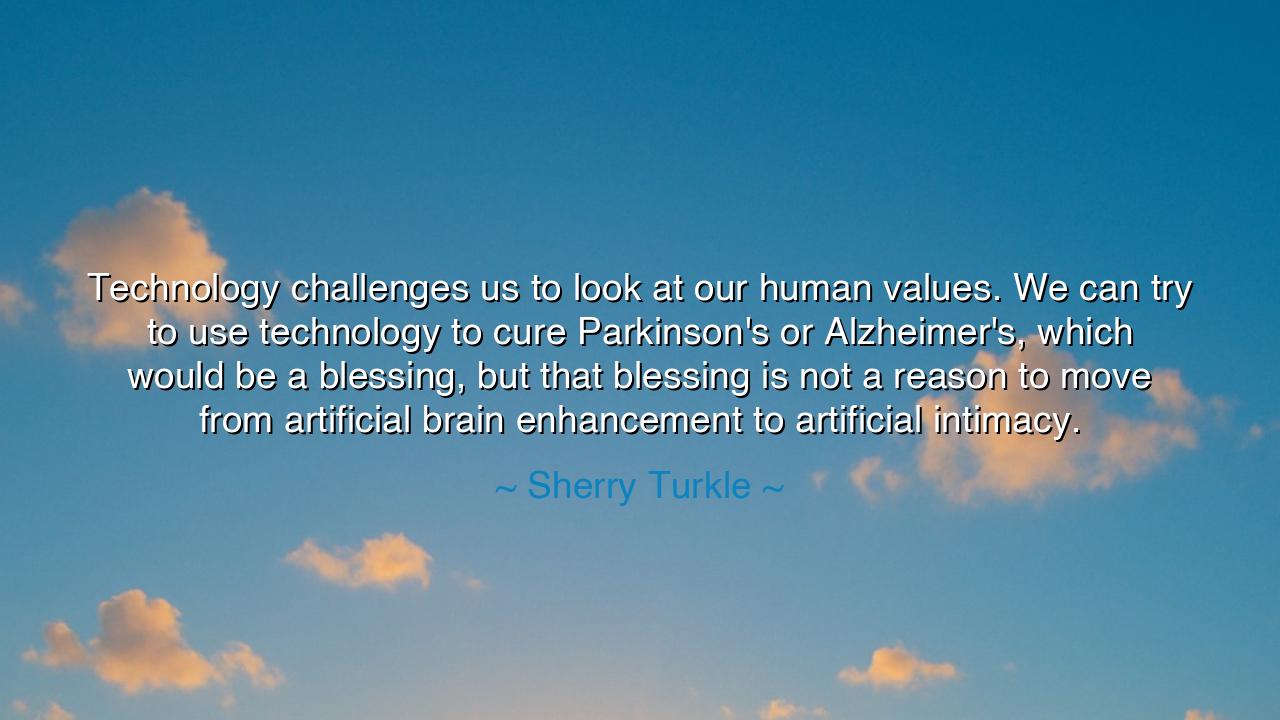
Technology challenges us to look at our human values. We can try
Technology challenges us to look at our human values. We can try to use technology to cure Parkinson's or Alzheimer's, which would be a blessing, but that blessing is not a reason to move from artificial brain enhancement to artificial intimacy.






Sherry Turkle, thinker of our age and prophet of the digital condition, once declared: “Technology challenges us to look at our human values. We can try to use technology to cure Parkinson's or Alzheimer's, which would be a blessing, but that blessing is not a reason to move from artificial brain enhancement to artificial intimacy.” In these words she offers both praise and warning. She honors the blessing of technology when it serves to heal, when it fights the cruel decline of the body and mind. Yet she draws a sacred line: we must beware when technology tempts us to replace the bonds of human intimacy with machine imitations, for in doing so we risk losing the very essence of our humanity.
The origin of this reflection lies in Turkle’s long study of the human relationship with machines, particularly in her works on digital life and robotics. As a scholar of psychology and society, she has witnessed how swiftly people come to form attachments with artificial companions, with screens and devices that simulate empathy but cannot truly love. She contrasts this with the noble potential of technology in medicine, where innovation can save lives and ease suffering. Thus she names the dilemma: technology as healer versus technology as substitute for love.
History offers examples that magnify her warning. In ancient times, physicians sought herbs and rituals to heal ailments of the body, but never imagined they could replace the warmth of a spouse or the tenderness of a child. Yet today, robotic caregivers and AI companions promise to soothe loneliness. One might recall the myth of Pygmalion, who fell in love with a statue of his own creation, preferring it over living human affection. That tale, once a fable of folly, now emerges as prophecy in an era where some turn to artificial intimacy rather than endure the risks and pains of human relationships.
Her words reveal a deeper wisdom: technology reflects our values. If we direct it toward healing, it shows our reverence for life. If we direct it toward replacing relationships, it reveals our fear of vulnerability. To heal Parkinson’s or Alzheimer’s is to extend dignity to the suffering. To build machines that mimic intimacy is to retreat from the messy, difficult, sacred labor of love. Thus Turkle reminds us that the question is not merely what we can do with technology, but what we should do, in light of who we wish to be.
The heart of her teaching is that intimacy cannot be manufactured. Love, patience, forgiveness, companionship—these are born of shared struggle, sacrifice, and presence. A machine may simulate words of comfort, but it cannot suffer with us, nor rejoice with the freedom of its own will. To replace intimacy with artificial substitutes is to hollow out the human experience, trading depth for convenience, and reality for illusion. The greatest risk is not that we will build machines too human, but that we will make humans content to live less humanly.
The lesson for us is clear: embrace technology as servant, never as master. Welcome it in hospitals, in research, in the fight against disease and decay. But resist its intrusion into the sacred space of love, friendship, and family. For these spaces are not problems to be solved, but mysteries to be lived. We must guard them fiercely, lest they be reduced to algorithms and scripted responses.
Practical actions follow naturally. Support research that brings healing to the sick, yet do not encourage systems that replace human companionship with artificial pretenses. Spend time with those who are lonely; offer real presence rather than delegating love to machines. Reflect often on your own values, asking whether your use of technology deepens your humanity or diminishes it. In every choice, weigh the difference between blessing and illusion.
Thus, let Sherry Turkle’s words echo for future generations: technology will always test the boundaries of our values, but only we can decide whether it heals or dehumanizes. Choose always the path that honors life and love. For while machines may enhance the body, only the human heart can nourish intimacy—and that, above all, must never be surrendered.






AAdministratorAdministrator
Welcome, honored guests. Please leave a comment, we will respond soon